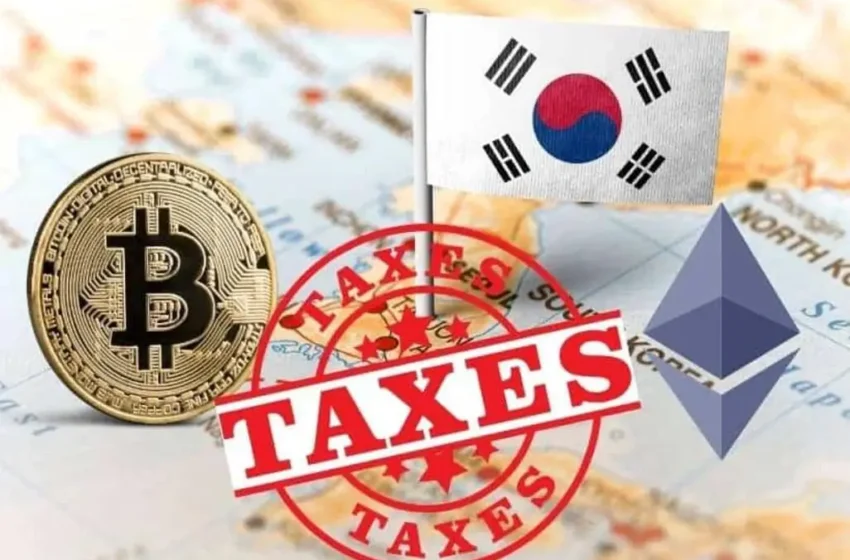South Korea Delays Crypto Gains Tax to 2027 During Political Shifts
(Originally posted on : Crypto News – iGaming.org )
The Democratic Party (KDP) of South Korea has consented to postpone the country’s cryptocurrency capital gains tax until 2027. Compared to their former determination on implementing the tax by 2025, this represents a substantial policy shift.
At a press conference on December 1, KDP floor leader Park Chan-dae declared the party’s acceptance of a two-year extension that the government and the ruling People’s Power Party (PPP) had suggested. The tax will now go into force two years after it was first planned to do so in January 2025.
Policy Debate Sparks Controversy
The ruling PPP had advocated for an even longer delay, suggesting a three-year deferral, which would have pushed implementation to 2028. They argued that rushing to tax crypto gains could drive investors out of the market. The proposal aligned with one of their electoral promises.
Previously, the KDP strongly opposed any delay. On Nov. 20, they criticized the PPP’s plan as a political maneuver, accusing the ruling party of leveraging the tax deferral to gain electoral favor. Instead, the Democratic Party suggested increasing the tax threshold from $1,800 to $36,000, aiming to shield small investors while taxing significant players.
The PPP, however, maintained that a slower rollout of the tax was essential for stabilizing the crypto market and fostering growth. Their stance gained traction with the KDP, leading to the current agreement for a 2027 implementation date.
New players only. Exclusive Welcome Bonus of 177% + 77 Free Spins
This delay reflects South Korea’s cautious approach to balancing investor sentiment and regulatory oversight in its rapidly evolving crypto market. By pushing the tax deadline, lawmakers hope to provide breathing room for the industry while ensuring future compliance.
Still, the debate underscores the political complexities surrounding cryptocurrency regulation in South Korea, with both parties seeking to align tax policies with broader economic goals.







 Bitcoin
Bitcoin  Ethereum
Ethereum  Tether
Tether  XRP
XRP  USDC
USDC  Solana
Solana  TRON
TRON  Figure Heloc
Figure Heloc  Lido Staked Ether
Lido Staked Ether  Dogecoin
Dogecoin  WhiteBIT Coin
WhiteBIT Coin  USDS
USDS  Cardano
Cardano  Bitcoin Cash
Bitcoin Cash  LEO Token
LEO Token  Wrapped stETH
Wrapped stETH  Hyperliquid
Hyperliquid  Ethena USDe
Ethena USDe  Wrapped Bitcoin
Wrapped Bitcoin  Canton
Canton  Binance Bridged USDT (BNB Smart Chain)
Binance Bridged USDT (BNB Smart Chain)  Monero
Monero  Chainlink
Chainlink  Stellar
Stellar  USD1
USD1  Wrapped eETH
Wrapped eETH  Rain
Rain  Dai
Dai  sUSDS
sUSDS  Hedera
Hedera  PayPal USD
PayPal USD  Zcash
Zcash  Coinbase Wrapped BTC
Coinbase Wrapped BTC  Litecoin
Litecoin  Avalanche
Avalanche  Shiba Inu
Shiba Inu  WETH
WETH  Sui
Sui  Toncoin
Toncoin  Cronos
Cronos  USDT0
USDT0  World Liberty Financial
World Liberty Financial  Tether Gold
Tether Gold  MemeCore
MemeCore  PAX Gold
PAX Gold  Uniswap
Uniswap  Polkadot
Polkadot  BlackRock USD Institutional Digital Liquidity Fund
BlackRock USD Institutional Digital Liquidity Fund  Ethena Staked USDe
Ethena Staked USDe  Mantle
Mantle  Aave
Aave  Falcon USD
Falcon USD  Aster
Aster  Pepe
Pepe  Bittensor
Bittensor  Global Dollar
Global Dollar  Circle USYC
Circle USYC  Ripple USD
Ripple USD  OKB
OKB  Bitget Token
Bitget Token  syrupUSDC
syrupUSDC  Pi Network
Pi Network  HTX DAO
HTX DAO  Sky
Sky  BFUSD
BFUSD  Ethereum Classic
Ethereum Classic  NEAR Protocol
NEAR Protocol  Ondo
Ondo  Superstate Short Duration U.S. Government Securities Fund (USTB)
Superstate Short Duration U.S. Government Securities Fund (USTB)  Internet Computer
Internet Computer  POL (ex-MATIC)
POL (ex-MATIC)  Gate
Gate  KuCoin
KuCoin  Worldcoin
Worldcoin  Pump.fun
Pump.fun  Cosmos Hub
Cosmos Hub  Jupiter Perpetuals Liquidity Provider Token
Jupiter Perpetuals Liquidity Provider Token  Midnight
Midnight  USDtb
USDtb  NEXO
NEXO  Jito Staked SOL
Jito Staked SOL  Ethena
Ethena  Spiko EU T-Bills Money Market Fund
Spiko EU T-Bills Money Market Fund  Official Trump
Official Trump  Binance-Peg WETH
Binance-Peg WETH  Rocket Pool ETH
Rocket Pool ETH  pippin
pippin  Algorand
Algorand  Binance Bridged USDC (BNB Smart Chain)
Binance Bridged USDC (BNB Smart Chain)  OUSG
OUSG  USDD
USDD  Wrapped BNB
Wrapped BNB  Janus Henderson Anemoy AAA CLO Fund
Janus Henderson Anemoy AAA CLO Fund  Function FBTC
Function FBTC